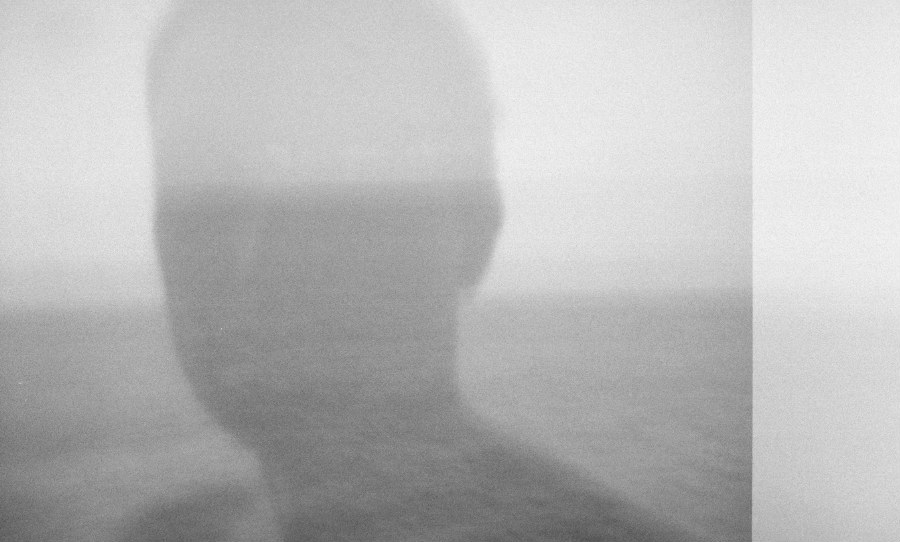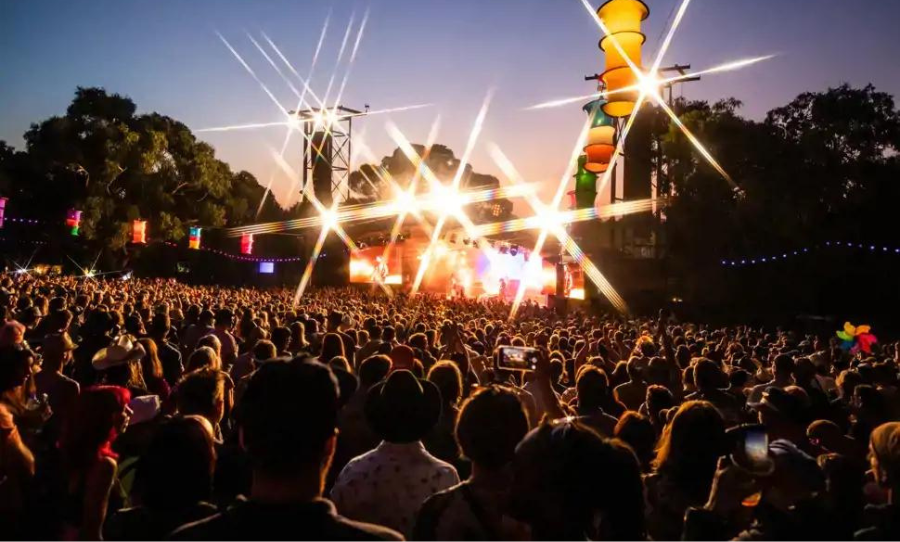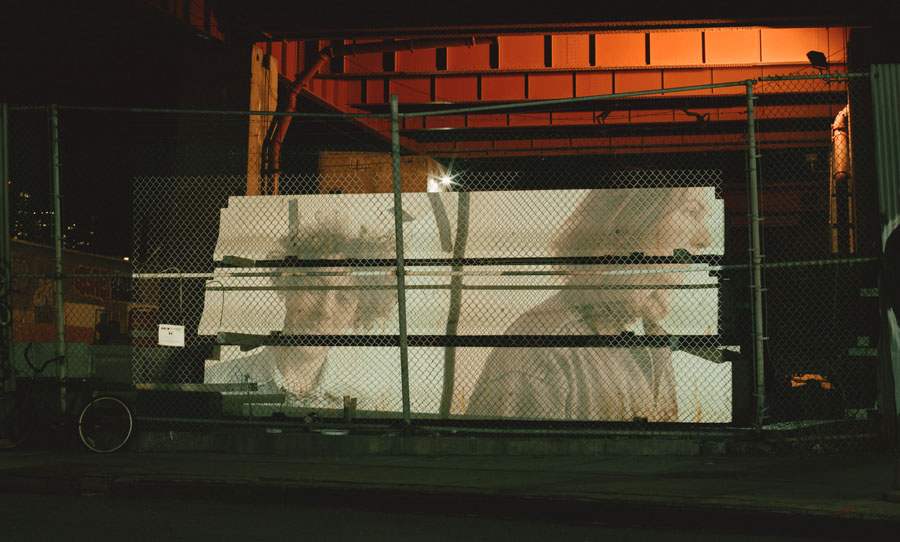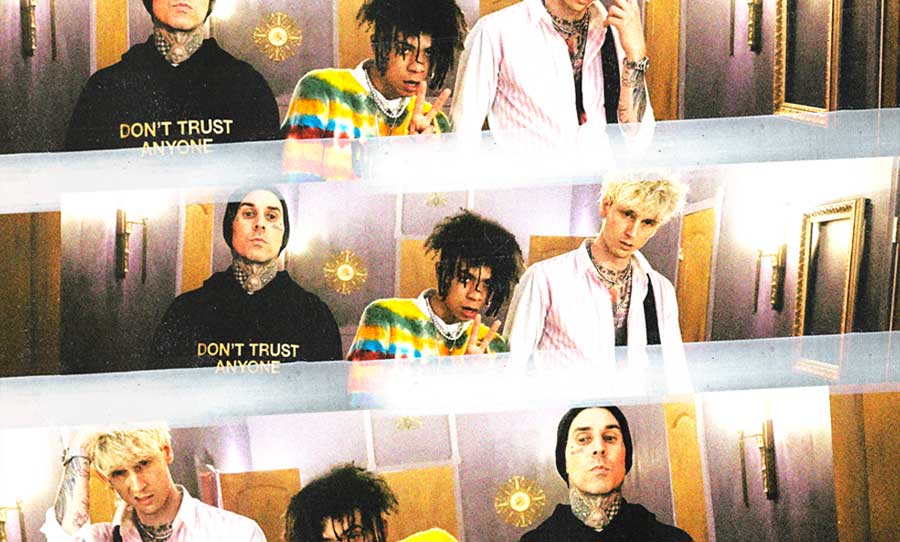The genesis of Rhye, a musical project from Canada’s Mike Milosh, is an interesting one. Choosing to forgo imagery of himself in teaser videos and press releases, back in 2013 the media jumped on Rhye as their next anonymous musician to mysticise.
As Milosh tells us, it was never his aim. His “name was on the credits”, after all. But the faux obscurity certainly added to the singer’s intrigue, and more than that, it allowed his audience the privilege of listening to his music without any “cult of celebrity” attached.
Soon after he would release debut album Woman and play over 400 shows off the back of it. In 2018 he released sophomore LP Blood and a remix album to compliment it. In 2019 he plans ever more new music, finding himself in the midst of a “creative explosion”.
With his first Australian show coming up this Sunday, we jumped on the phone with Milosh to discuss Pink Floyd, the benefits of hiding one’s face, and his dream to direct a film.

Before he lands in Australia for the first time since 2015, we catch up with Canadian songwriter Rhye, aka Mike Milosh.
HAPPY: I’ve seen you call Dark Side of the Moon the most influential album of your life. Do you still feel that way, and what was it about that record that made you think that?
MIKE: My dad showed me Dark Side of the Moon first, I was really really young when I heard it. I was probably five or something. My dad put these headphones on me, he had these really great headphones, and I don’t know, as a little kid I was blown away by it. It’s weird, it’s just never left me… I love it. I did a dance performance to it when I was younger. It’s honestly just the record that I’ve had so many experiences with and sonically, it’s as cool a record now as it was then.
HAPPY: Which song was the dance performance to?
MIKE: Us and Them. One of them. I did another one to Time.
HAPPY: Pink Floyd, despite being one of the largest cogs in the music machine of all time, were always against the system. Did you inherit that feeling from them at all?
MIKE: I think what I was really interested in in terms of inspiration was the idea of being creative. I like being creative in my own way, I don’t want to sound like Pink Floyd, I don’t do psychedelic rock, but I really admire their creativity and their interest in production. In making things sounds unique to them, their use of sound, their use of tone… also they’re a very political band and I’m not very political on purpose, because I want anyone to hear my music and not care about politics. So there’s a huge difference between me and Pink Floyd you know? You wouldn’t hear a record like The Wall out of me. It’s just creatively, they’re an incredible band. Very inspiring.
HAPPY: I think you can identify with a band as creatively as you do musically. They’re totally separate things.
MIKE: Mhm.
HAPPY: But to talk about them for one more second, they definitely helped pioneer being secretive about their image in a certain way. Their cover art single-handedly turned the world off headshots in the ‘70s. To link that back to you, do you remember any of that period where Rhye was anonymous fondly?
MIKE: It’s interesting, I talk about this a lot with my girlfriend because people do recognise me. A cool thing is people who do say hi to me are very respectful and very nice, I’ve never had any weird experiences or things like that. There is something really helpful when nobody knows who you are, like being able to walk through my concert and nobody knows that I’m the person singing, I love that experience. I think those days are over, but for me… I guess I’m the kind of artist that if you do know me, the people who are connected to me are a bit more mature in their approach. I’ve got friends, other musicians that have more of a celebrity status and people approach them in horrifying ways, it’s frustrating for them because they can’t go to a movie without having to sign autographs. I don’t have that kind of stuff, I’m not really looking for that, I’m not trying to be a celebrity.
HAPPY: Fair enough. Artists who have done the anonymous thing often make music that’s faceless in a way; they’re robots or aliens, or their music is instrumental and they don’t appear on any artwork. On the other hand, Rhye’s music is very personal. Do you think it could have continued as a secret or was it too human to stay anonymous?
MIKE: Well, number one I never really intended to be anonymous. There was this whole thing that happened in the press where they said I was anonymous, and I think it was just because I didn’t really put press shots up. You know in Daft Punk they literally put on helmets and behave anonymously, but I don’t do that. At my concerts you see exactly who I am and you see me in the pictures, also I had a hundred photos from my Milosh project before Rhye, and my name was on the credits… I personally never approached it with the intention of being anonymous, but I didn’t want to make the central campaign just a picture of this guy. I started getting really frustrated with how people are marketed, by design it’s kind of made to create a cult of celebrity, and I just thought it would be more cool for the music to be this thing that we lead with.
Like do you like the song and don’t care who made it? Do you care that it’s some Canadian dude, you know? Who cares who made the music? I love that way that I first discovered music, like for example Pink Floyd, I just saw this triangle with this rainbow shooting through it, I had no idea who was behind the music. It wasn’t until much later that I watched videos that I actually saw them. There’s something just so pure and beautiful about liking a song because you like the song, hearing something and thinking ‘that’s enough’. That’s kind of cool. That being said, I’m not trying to be anonymous. You can see me if you come to the show.
HAPPY: Do you think any aspect of that has remained? You’re not on the packshots or anything for the album still. I still get the essence of that feeling in all the stuff Rhye puts out.
MIKE: Yeah I’m not on the album cover, but now you’ll definitely see me if you Google that Paris show where we shut down Charles de Gaulle airport, it’s a pretty tight shot of me singing. I think I’m showing up musically, I don’t want to be a model and I don’t want to be judged in that way. I haven’t really embraced posing, you know?
HAPPY: You’ve always had a strong creative control over Rhye, was handing the album over to 14 different artists to remix a tough decision?
MIKE: No, I mean they’re all artists I think make cool music of their own, and I find the remix process kind of interesting because I give it to them and then just wait until they’re done… and then I hear it. I’m not trying to be controlling, the whole point is to hear what another artist does and to hear what their interpretations of the songs are, and that’s the value of it for me. It’s just kind of cool.
HAPPY: Since 2017 you’ve also begun to direct your own music videos. Is moving into directing short films or music videos something that’s always interested you?
MIKE: Yeah I like shooting. I have a RED camera and a RED package, you know I love film and there’s a part of me that wants to be a director more than anything, whereas music is something I’m doing. I think being a director is a bit more difficult, it takes some more financial resources. I’d like to make a film in the near future, even if it is just a short film. I don’t have to direct my music videos, I just wanted to, you know? I’ll see how the future goes, I’m releasing an EP in March and we’ve got videos that me and my girlfriend have written and we’re figuring out how to shoot them and how to accomplish what we’re trying to get out of the video. I probably will shoot it, but if there’s parts of the video that are above my skill level we’ll get someone else shooting it.
HAPPY: Have you done video work for others, or just with your own work?
MIKE: When I was much younger I made a couple of documentaries about auto racing and they never came out because I got into a lot of trouble with Fox, I shot a bunch of stuff at racetracks where I didn’t have the right to. So it grounded those projects, but they were still really cool. I spent like six months working on this one documentary. I’ve never done a creative film for another musical artist, and I don’t think that’s what I’m trying to do… I would shoot photography for someone else if I liked what they were doing and they wanted me to shoot it, I’d be kind of interested, but I’m not trying to be a music video director.
HAPPY: You talk about doing a film… what’s the dream project? Would it be something that’s purely film and very much in that world, or would it be something that crosses over into music?
MIKE: So I wrote this script, this rock opera script that I would like to film, and I would score it myself, but the theme is not related to music. It’s about a man and a woman that share an experience together, it’s not about a musician or something like that.
HAPPY: The last time you were in Australia was around 2015, right?
MIKE: Yeah.
HAPPY: Is there anything you remember from your time here?
MIKE: Yeah, I hung around Sydney for a while, walked around and tried to explore the city, went out a couple of times for breakfast and stuff, I’m always trying to find good breakfasts. I did a studio session in Sydney too, then I loved Melbourne… it was a bit more rainy there. It literally looked like Toronto, Melbourne really felt like Toronto so I was very comfortable in a weird way. It was interesting, I had a great time.
HAPPY: Was that during that period when you did around 400 shows?
MIKE: Well I released the first record and I kept touring, I didn’t think of it like an album cycle or anything. I also thought that I wasn’t going to make another Rhye record because there was a lot of legal and contractual restraints… it became clear that if I wanted to make another Rhye record that I would have to buy out the record deal and so the only way I thought to do that was to keep performing and finance it myself. It took a little longer than I thought, but I weirdly – and not in a masochistic way – I think it was beneficial for me because I played so many shows as a result of that that I didn’t rush making another record. I didn’t make a record until I was truly ready to, which was cool. Now I’m in the middle of another creative explosion, I’ve got this EP, I’m already working on the next Rhye record… but there must have been a reason why I took so much time between those two records, and part of it was the fact that I played so many concerts. It was so fun to travel around and play so many shows.
HAPPY: Is the EP a Rhye EP?
MIKE: Yeah it’s a Rhye EP. It’s a very piano driven EP, so it’s a little gentler or more sombre than the other music.
HAPPY: I’m sure some people will love to hear that. Well that’s about all I had. I thought I’d end by saying the festivals you’re playing in Australia look really amazing. They’re great ones to be playing.
MIKE: Everyone keeps saying that, which is cool, everyone’s so hyped about those festivals. I love it.
HAPPY: Totally, one’s new but it’s run by this label who are really respected and the lineup’s amazing. It’s going to be a good time, I reckon.
MIKE: It’s sweet, I’m excited about it.
Blood is out now. Catch Rhye live in Australia:
Sun 24 Feb – Perth Festival
Wed 27 Feb – The Triffid, Brisbane
Thurs 28 Feb – The Triffid, Brisbane
Fri 1 March – Metro Theatre, Sydney
Sun 2 March – Farmer and the Owl Festival, Wollongong
Mon 4 March – ANU Theatre Complex, Canberra
Wed 6 March – Melbourne Recital Centre, Melbourne
Thurs 7 March – Melbourne Recital Centre, Melbourne
Sat 9 March – Golden Plains Festival
Sun 10 March – Adelaide Festival
Grab your tickets on Rhye’s official website.


